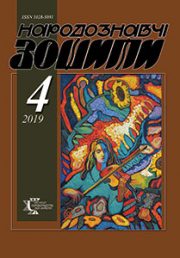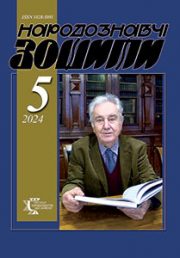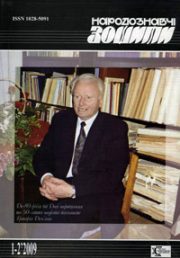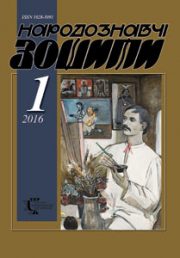The Ethnology Notebooks. 2020. # 6 (156), 1383—1388
УДК 801.81:82.163.4-42
DOI https://doi.org/10.15407/nz2020.06.1383
Yaroslav HARASYM
- ORCID ID: https://orcid.org/0000-0002-1679-1287
- Ivan Franko National University of Lviv
- Doctor of Philology, Professor of the Academician
- Filaret Kolessa Department of Ukrainian Folkloristics
- 1, Universytetska Str., 79000, Lviv, Ukraine,
- e-mail: jaroslav.harasym@gmail.com
Theme outline. Scholarly reception of historical stages of the economic theory development and of the periodic changes in the economic activity is directly related to the issue of shaping social strata and hence to the moral-ethical code of their co-existence both within the monoethnic social structure and in the international communication. Property-related stratification of post-feudal society, gradual loss of the privileges inherited from ancestors and predictable democratization of political atmosphere led to the establishment of fixed stereotypization of axiological categories “wealth/poverty” in the world outlook of the European nations of the 19th century and their axiological paradigm.Historiographic reception of this issue places a significant importance to folk songs inasmuch they reflect the view of the people on their own history, and therefore they appear to be a valuable source to complement the written archive records and authored chronological factual account (subject matter of the research).
Chronological boundaries of the research —end of the 18th — early 19th centuries.
Objective of the research — to identify the moral-ethical panorama, focused on the approach to the socially polar (in terms of financially material background) strata of the Ukrainian and Polish communities, in the folk songs the proliferation whereof was acknowledged by the records throughout the 19th century, and to establish the ethno-psychological factors which could contribute to the formation of national cultural behavioural stereotypes in evaluation of “wealth/poverty” in the process of sociocultural evolution of the nation.
Topicality of the paperis defined by the fact that this issue is highlighted in the Ukrainian scholarly research for the first time.
Conclusions: All in all, in the existential context the moral-ethical directedness of the considered social-everyday songs in the Polish and Ukrainian oral traditions for the most part avoids promoting behavioural utilitarianism in its aspiration for incessant enrichment, tending instead to glorify good old virtue.
Methods of research —comparative, typological and structural-functional.
Keywords: folk songs, ethnoethical canon, mentality, axiological paradigm, social hierarchy, stereotype.
REFERENCES
- Drahomanov, M. (2006). New Ukrainian songs about public affairs (1764—1880). Introductory article, textual elaboration and commentary by M. Chornopysky. Lviv: Litopys [in Ukrainian].
- Holovatsky, J. (Ed.). (1878). Folk songs of Galician and Hungarian Russia: in 3 part. (Part 1: Thoughts and Thoughts). Moscow: Ed. Imp. Islands of History and Antiquities of Russia at Moscow Un-te [in Ukrainian].
- Harasym, J. (2008). Ethnoaesthetics of Vasyl Stefanyk. Mythology and folklore, 1, 62—68) [in Ukrainian].
- Drahomanov, M. (1883). Political songs of the Ukrainian people of the XVIII—IX centuries. In Mykhailo Drahomanov. Part one. Section one. Geneva: Hromada Printing House [in Ukrainian].
- (1878). Collection of information on national anthropology (Vol. 2). Krakow: At the Printing House of the Jagiellonian University [in Polish].
- Haidai, M. (1972). Folk ethics in the folklore of Eastern and Western Slavs (The problem of good and evil). Kyiv: Naukova dumka [in Ukrainian].
- (1892). Collection of information on national anthropology (Vol. XV). Krakow: Published by the Academy of Learning [in Polish].
- Kolberg, O. (1871). Lud: its customs, way of life, language, traditions, proverbs, rituals, witchcraft, games, songs, music and dances (Ser. VI). Krakow: At the Printing House of the Jagiellonian University [in Polish].







